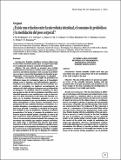Por favor, use este identificador para citar o enlazar a este item:
http://hdl.handle.net/10261/74956COMPARTIR / EXPORTAR:
 SHARE
BASE SHARE
BASE
|
|
| Visualizar otros formatos: MARC | Dublin Core | RDF | ORE | MODS | METS | DIDL | DATACITE | |

| Título: | ¿Existe una relación entre la microbiota intestinal, el consumo de probióticos y la modulación del peso corporal? |
Otros títulos: | Is there a relationship between gut microbiota, probiotics and body weight modulation? | Autor: | Rodríguez, Juan M.; Sobrino, O. J.; Marcos, Ascensión CSIC ORCID; Collado, María Carmen CSIC ORCID; Pérez Martínez, Gaspar CSIC ORCID ; Martínez-Cuesta, M. Carmen CSIC ORCID ; Peláez, Carmen CSIC ORCID ; Requena, Teresa CSIC ORCID | Fecha de publicación: | 2013 | Editor: | Aula Médica Ediciones | Citación: | Nutricion Hospitalaria 28(Supl.1): 3-12 (2013) | Resumen: | [ES]: [Introducción]: Estudios científicos recientes indican que la microbiota intestinal puede jugar un papel importante en la modulación del peso corporal del hospedador.
[Objetivo]: En este artículo se presenta una revisión actualizada de la literatura científica sobre el papel potencial de la microbiota intestinal y del consumo de probióticos en el peso corporal del hospedador, incluyendo la predisposición y la prevención del sobrepeso y la obesidad.
[Resultados y conclusiones]: El empleo de probióticos en diferentes etapas de crecimiento, tanto en el hospedador animal como el humano, está habitualmente asociado a beneficios en la salud. Es evidente que los beneficios asociados al crecimiento no implican necesariamente un aumento del tejido adiposo ni tampoco una predisposición al sobrepeso o la obesidad. Hasta el momento, los datos que asocian un tipo de microorganismos específicos con la obesidad humana no son concluyentes ya que no determinan si es dicha microbiota la que juega una función causativa de la obesidad (fenómeno primario), o si es la microbiota intestinal la que está modulada en respuesta a dietas obesogénicas u otros factores relacionados con la patogénesis de esta condición (fenómeno secundario). Los estudios dirigidos a la modulación de la microbiota intestinal para prevenir o controlar la obesidad del hospedador, incluido el uso de probióticos, muestran resultados prometedores. De hecho, el consumo de probióticos en el entorno materno-infantil podría contribuir al control del peso corporal en etapas posteriores mediante la modulación de la microbiota intestinal infantil. Sin embargo, son necesarios más estudios que empleen ensayos aleatorizados, doble ciego y controlados por placebo para poder demostrar la eficacia de cepas probióticas específicas para la prevención o el tratamiento del sobrepeso y la obesidad. En el marco de la actual pandemia de obesidad, el empleo de cepas probióticas de las que se disponga de evidencia científica sobre un efecto beneficioso frente a determinados factores de riesgo asociados a la obesidad podría servir, junto con cambios en la dieta y el fomento de la actividad física, a la modulación del peso corporal. [EN]: [Introduction]: Recent scientific studies show that gut microbiota may play an important role in the modulation of the body weight of the host. [Objective]: The aim of this article is to present an updated review of the scientific literature dealing with the potential roles of the gut microbiota and probiotics on the body weight of the host, including the predisposition to and prevention of overweight and obesity. [Results and conclusions]: The use of probiotics in different growth stages, both in human and animal hosts, is usually associated to a beneficial effect to the host's health. Admittedly, benefits associated to growth do not necessarily imply an increase in the adipose tissue or a predisposition to overweight or obesity. At present, the data that link the presence of specific gut microbial groups with obesity are controversial since it is unknown if they represent a cause or a consequence of obesity-associated diets and/or any other factor related to the pathogenesis of this condition. Studies dealing with the modulation of the gut microbiota to prevent or control obesity in the host, including the use of probiotics, are promising. In fact, probiotic intake in the mother-infant context might contribute to the control of the adult body weight by modulating the infant gut microbiota. However, well-designed randomized double-blind placebo-controlled trials are required to demonstrate the efficacy of specific probiotic strains for prevention or treatment of overweight and obesity. In the frame of the current obesity pandemics, use of probiotic strains with scientifically-substantiated properties against obesity risk factors may constitute a future approach, complementary to changes in diet and life style, for the modulation of the body weight. |
Descripción: | Suplemento dedicado al IV Workshop Probióticos, Prebióticos y Salud: Evidencia Científica celebrado en Madrid del 31 de enero al 1 de febrero de 2013.-- Este trabajo se encuentra bajo la licencia Creative Commons Attribution 3.0. | Versión del editor: | http://www.aulamedica.es/gdcr/index.php/nh/issue/view/v28s01/showToc | URI: | http://hdl.handle.net/10261/74956 | E-ISSN: | 1699-5198 | Identificadores: | issn: 0212-1611 |
| Aparece en las colecciones: | (ICTAN) Artículos (IATA) Artículos (CIAL) Artículos |
Ficheros en este ítem:
| Fichero | Descripción | Tamaño | Formato | |
|---|---|---|---|---|
| relación entre la microbiota intestinal.pdf | 431,45 kB | Adobe PDF |  Visualizar/Abrir |
CORE Recommender
Page view(s)
650
checked on 23-abr-2024
Download(s)
256
checked on 23-abr-2024
Google ScholarTM
Check
Este item está licenciado bajo una Licencia Creative Commons

